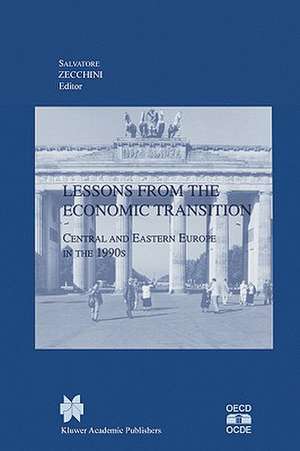Lessons from the Economic Transition: Central and Eastern Europe in the 1990s
Editat de Salvatore Zecchinien Limba Engleză Paperback – 28 feb 1997
| Toate formatele și edițiile | Preț | Express |
|---|---|---|
| Paperback (1) | 1232.89 lei 43-57 zile | |
| SPRINGER NETHERLANDS – 28 feb 1997 | 1232.89 lei 43-57 zile | |
| Hardback (1) | 1238.74 lei 43-57 zile | |
| SPRINGER NETHERLANDS – 28 feb 1997 | 1238.74 lei 43-57 zile |
Preț: 1232.89 lei
Preț vechi: 1503.53 lei
-18% Nou
Puncte Express: 1849
Preț estimativ în valută:
235.95€ • 245.42$ • 194.78£
235.95€ • 245.42$ • 194.78£
Carte tipărită la comandă
Livrare economică 14-28 aprilie
Preluare comenzi: 021 569.72.76
Specificații
ISBN-13: 9780792398578
ISBN-10: 0792398572
Pagini: 590
Ilustrații: XXXI, 590 p.
Dimensiuni: 155 x 235 x 30 mm
Greutate: 0.88 kg
Ediția:Softcover reprint of the original 1st ed. 1997
Editura: SPRINGER NETHERLANDS
Colecția Springer
Locul publicării:Dordrecht, Netherlands
ISBN-10: 0792398572
Pagini: 590
Ilustrații: XXXI, 590 p.
Dimensiuni: 155 x 235 x 30 mm
Greutate: 0.88 kg
Ediția:Softcover reprint of the original 1st ed. 1997
Editura: SPRINGER NETHERLANDS
Colecția Springer
Locul publicării:Dordrecht, Netherlands
Public țintă
ResearchCuprins
I — Main successes and failures in the transition strategy.- 1. Transition approaches in retrospect.- 2. The transition in Eastern Europe and the former Soviet Union: some strategic lessons from the experience of 25 countries over six years.- 3. Transition to date: a comparative overview.- 4. From transition to market: evidence and growth prospects.- 5. Lessons to be drawn from main mistakes in the transition strategy.- 6. Adjustment without recession: a case study of Hungarian stabilization.- 7. The interplay between economic and political transition.- 8. Political constraints and the transition experience.- 9. Comments.- 10. General discussion.- 11. Policy conclusions.- II — Enterprise restructuring and private sector development.- 1. Comparing two Great Depressions: 1929-33 to 1989-93.- 2. Restructuring outcomes and the evolution of ownership patterns in Central and Eastern Europe.- 3. Corporate governance and the political effects of privatisation.- 4. Large privatisation, restructuring and foreign direct investment.- 5. The evolution of bank credit quality in Romania since 1991.- 6. Comments.- 7. General discussion.- 8. Policy conclusions.- III — Unemployment and the reform of social policies.- 1. Unemployment, restructuring and the pace of transition.- 2. Transformation as a demographic crisis.- 3. Labour market policy and the reallocation of labour across sectors.- 4. Central and Eastern European labour markets in transition.- 5. Reforming tax and benefit systems in Central Europe: lessons from Hungary.- 6. Comments.- 7. General discussion.- 8. Policy conclusions.- IV — External policies.- 1. Currency convertibility in transforming economies: was it a mistake?.- 2. Exchange rate policies in post-communist economies.- 3. Access to Western markets, andEastern effort levels.- 4. Interrelations between subregional co-operation and EU enlargement.- 5. Foreign direct investment in Eastern Europe and the former Soviet Union: results from a survey of investors.- 6. Comments.- 7. General discussion.- 8. Policy conclusions.












